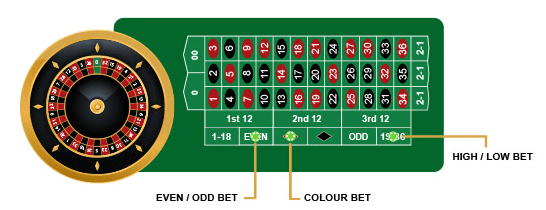The Labouchère Roulette Strategy
This is one of the more complicated Roulette systems to learn. It is easy so far it only uses the even odds outside bets only, which makes the betting options very simple, but the inner workings of the strategy itself does take some thought and due process as it is has a semi-complicated number system to follow.
In this guide, we will be delving into the finer points of this strategy including:
- How does the Labouchère system work?
- Can it help give you a profitable session?
- What guarantees and flaws are there?
Are there some good reasons to use the Labouchère Strategy?
For those that have tried the less complicated systems such as the Paroli and Martingale systems, the Labouchère is the next step up. Progressively testing out more complex systems is a good reason to try the Labouchère system.
Plus, if you are looking for a strategy that offers more stimulation than just doubling your winnings when you win or doubling your bet when you lose, then the Labouchère system is a good option because it does much more than this.
Here are some features of the system:
- Make a profit despite more losses than wins
- Test your ability to use more complicated strategies
- You can take this system to any even odds games
- Extend the time you get to play at the Roulette table
Roulette’s Labouchère strategy is complex to understand at first. To be honest, when we start going into the details of how the strategy works, you may have to come back and read this strategy guide once more just to be sure you understand the system.
Due its complexity, the one thing we can say is that it does offer a far more interesting and challenging sequence of rules to implement than the Paroli and Martingale systems, which are in close proximity to the theory behind the Labouchère Roulette strategy.
What is the Labouchère Strategy?
It is a system created by Henry Labouchere (1831 – 1912) and is based on negative progression. As with the Martingale system, it works on the premise that you will generally be chasing losses in order to make a profit.
Other names for the Labouchère Strategy you may hear are:
- American Progression
- Split Martingale
- Cancellation System
As Roulette is designed to give the house an edge, you can always expect to be behind at several points in a session. This is what gives the Labouchère strategy its effectiveness. By and large, it is designed to take into account the house edge and potential player loss, and turn this into a profit.
Here are some advantages to the system:
- Sticking to the system clearly results recouped losses
- Simultaneously recoup losses and make a profit
- Turn a high loss rate and low win rate into a profit
Essentially, it is all about covering multiple losses with a lesser number of multiple wins in comparison to make a profit. That is to profit despite the number of losses outweighing the number of wins.
Labouchère Strategy’s Key Features
For the main feature of the Labouchère Strategy, you need to understand which bets are the even odds outside bets. To being with, there are only 5 outside bets anyway. We can discount the column bets and dozen bets because they have 2-1 odds, and so they are not even odd bets.
The 3 even odds bets
(1) Odd/even, (2) red/black, and (3) high/low are the only 3 even odds bets on the entire Roulette board. They make up for 3 of the 5 outside betting options. As the Labouchère Strategyis designed for bets that pay even odds, you will only be betting using these 3 options with this system.
Here is a pictorial example of the 3 even odds outside betting options:

What are the pay out rules for even odds bets?
If you are a newbie to gambling, then even odds bets are a good place to start. Well at least they are if you are getting close to 50/50 odds on the outcome. For instance, there is a 50/50 chance that tails will come up when flipping a coin. Offering even odds to bet on a coin flip is certainly fair odds.
Yet, if you rolled a dice, there are 6 possible outcomes. You would not take even odds on the number 3 rolling in when the odds are 6-1. You would naturally want 6-1 odds or 5-1 odds at the very least. However, if someone offered even odds on 1, 3, 6 coming out on a dice roll, then there is a 3-6 (50/50) chance of a winning roll. You could easily accept even odds on this bet.
How do even odds bets pay-out?
It is very simple. Even odds pay-outs match, or are very close to, the chance you have of winning the bet. Like a coin flip – you have a 50/50 chance of winning = 50/50 bet. To reflect this match in odds, you would bet 1, and you get 2 back if you win or 0 if you lose. A win means you make a profit of 1. This is because your bet of 1 is returned, and you get 1 more on top for the win; a total profit of 1.
When you play the even odd bets on Roulette, the same principle is applied, but there is a slight edge favouring the house.
Here are the other key features:
- You use a sequence of numbers to decide your next bet
- You eliminate numbers as you win
- You add numbers to the sequence when you lose
- The betting amounts are progressively lower or higher
What Level of Roulette Player Do I Need to Be to Learn This System?
As long as you learn this system well, then there is no reason why you cannot implement it as a beginner. It is basically there to take advantage of the even odds betting system, which is the easiest system to learn on the Roulette table.
Being new to Roulette would most certainly mean starting off with the outside betting options. These are by far the easiest bets to get to grips with when you play Roulette. As the Labouchère system only uses these 3 outside betting options, all of which have simple even odds prospects and pay-outs, beginner Roulette players can test this strategy out with ease.
Saying this, for those of you playing Roulette for the first time, we recommend trying out the Paroli system first, and then move on to the Martingale system. You will quickly make progress and move to using the Labouchère system.
Once you have mastered all 3 systems, you will be well on your way to becoming a seasoned Roulette player. You can then start to look into other Roulette systems to add to your knowledge.
Labouchère Strategy Rules and Sequences
Just as a reminder, there are just 3 types of bets you are going to use. This makes things very simple when you are contemplating the many betting options you are faced with:
- Red/Rouge or Black/Noir
- Odd/Passe or Even/Manque
- Low/Impair or High/Pair
The next steps are how to implement the betting system:
You need to choose a sequence of numbers and this will be something that you will figure out how to customise the more you play this system. For now, let’s keep it very simple just so you get an idea of how the system is implemented.
How to use the sequence when you win:
- Sequence: 1, 2, 3, 4, 5.
When you make your initial starting bey, you will take the very first number and the very last number.
- First Bet: 1 + 5 (1, 2, 3, 4, 5)
Win: If you win the bet, then you can now eliminate the numbers 1 and 5 from the sequence. This is also where the Labouchère system picks up its name as the cancellation system.
- Second Bet: 2 + 4 (1, 2, 3, 4, 5)
Now you next bet will be 2 + 4 = 6. Should you win again, then you eliminate both the 2 and 4. Now you are left with 3 as your bet.
How to use the sequence when you lose:
Losses mean that the sequence starts to add more numbers, or in essence, the sequence gets longer. For example, let’s go back to the aforementioned sequence stage and play the same sequence.
- Sequence: 1, 2, 3, 4, 5.
As mentioned, you take the first and last numbers and add them together for your bet amount. There is no exception to this rule, so it is easy to remember: first number + last number = bet amount.
- First Bet: 1 + 5 (1, 2, 3, 4, 5)
Lose: Losing the bet means you need to increase the amount you wager on the next coup. (FYI: A coup is a round of betting and spin in Roulette). To increase your wager, you add a number to the sequence.
- New Sequence: 1, 2, 3, 4, 5, 6
Now you can see that we have added the 6 to original sequence because of the original lost bet.
- Second Bet: 1 + 6 (1, 2, 3, 4, 5, 6)
Now the next bet will be 7 because you are adding the first and last number from the new sequence. In this case it is 1 + 6 = 7.
What happens to wins and losses from this point:
Loss: At this stage, if you lose, you will add 7 to the sequence making it (1, 2, 3, 4, 5, 6, 7), therefore the next bet will be 7 + 1.
Win: A win after coup 2 would mean shaving off the first and last numbers from the previous sequence used. In this case it would be (1,2, 3, 4, 5, 6) making your next bet 2 + 5 = 7.
What help will I get from using the Labouchère System?
As you have probably noticed, when you lose the bets are incrementally more. However, they are not doubled and so the betting is more controlled compared to systems such as the Martingale system, which can spiral out of control if you happen to hit a long drawn out losing run.
The sequence is also set up so once you do eventually eliminate all the numbers from the sequence, you will turn over a profit. This strategy will make sure that firstly, you stay at the table for long time. Especially if it is one of those eratic days when red, black, red black or odd, even, odd, even results turn up sequentially.
A Demonstration of the Labouchère System
In this scenario, we will go through a Roulette player’s bets on the high/low even odds outside betting option. The sequence chosen is 3, 4, 5, 6. Just 4 numbers to begin with. He goes onto a table where outside bets are a minimum of £5.00, and the player has a total of £100 to play with.
Spin 1: 3 + 6 = £9 bet (3, 4, 5, 6)
Loss: Not a great start! The player now adds to his sequence.
Total Balance: £91The player has lost –£9
Spin 2: 3 + 7 = £10 bet (3, 4, 5, 6, 7) as the new sequence
Win:£20 is paid to the player and now 2 numbers are eliminated from the sequence.
Total Balance: £101 as the player ended spin 1 with £91 and won £20 on spin 2. That £20 is made up of £10 returned for the bet and £10 for winning the bet.
Spin 3: 4 + 6 = £10 bet (3, 4, 5, 6, 7) = 4, 5, 6 as the new sequence
Loss: Another loss means another number being added to sequence.
Total Balance: £91 because the player started with £101 and lost the £10.
Spin 4: 4 + 7 = £11 bet (4, 5, 6, 7) as the new sequence
Win:£22 is paid to the player and now 2 numbers are eliminated from the sequence.
Total Balance: £102 as the player ended spin 3 with £91 and bet £11 leaving just £80. The player won £22 on spin 2 giving a new total of £102. That £22 was made up of £11 returned for the bet and £11 for winning the bet.
Spin 5: 4 + 7 = £11 bet (4, 5, 6, 7) = 5, 6 as the new sequence
Win:£22 is paid to the player and now the sequence had ended as the final 2 numbers are eliminated.
Total Balance: £124
In the end, the player finished this sequence with a £124 bankroll. That is a healthy £24 profit for just 5 spins worth of risk. You can also see that when you lose using this system, the incremental increases are relatively low each time. The other point worth noting was that this player covered his losses after every win.
Online Casino Bonuses considerably help you master the Labouchère Strategy
As with any gambling system, you are always going to lose a few bets either caused by mistakes or via lack of planning. To be honest, most of the time losses come down to lack of discipline. The only way to learn what the cause of a mistake is or to fix discipline issues, is by making the mistakes in the first place.
How do bonus codes help in this situation?
Casino bonus codes act as a huge cushion to potential losses that are made because you are only just trying out a new system. The Labouchère Strategy is no exception to the rule. You can still make mistakes or have a momentary lack of judgement when playing the game and implementing a strategy.
If you are new to Roulette, and you are looking for an online casino to practice without risking heavy losses, then we would like to recommend one of our top 5 casinos:
- Cloud Casino
- Gaming Club
- Jackpot City
- Lucky Nugget
- Vegas Paradise
These casinos offer enticing bonus incentives that will help you get more out of your deposits. With free money given away on top of the cash you deposit, you have room to make mistakes, practice new strategies and fine tune your Roulette play.
How do I get more money from deposits?
There are several types of deposits you can take advantage of; such as, Welcome Bonuses for new joiners, weekly or monthly bonuses as well as daily bonuses that giveaway free casino credits and cash on a regular basis.
- 25% Deposit matches (Get 25% on top of the amount you deposit)
- 50% Deposit matches (Get 50% on top of the amount you deposit)
- 100% Deposit matches (Get 100% on top of the amount you deposit)
- 200% Deposit matches (Get 200% on top of the amount you deposit)
VIP and Loyalty Rewards Benefits:
Adding to the flurry of cash incentives, there are VIP rewards programs that give you points and rewards for being a regular player. If you can master a Roulette system like the Labouchère Strategy, then you should in theory only have 1 of 3 outcomes:
- Make a profit
- Break even
- Only report small losses
All 3 of these outcomes will mean that you should be able to maintain your casino bankroll/balance. If you are able to do this, then you will always have cash to play with at the casino. And with sessions not costing you much at all, this means you will be able to continue to play regularly and build up VIP points.
With more VIP points being awarded, you will be able to take advantage of cashbacks on losses, increased bonus offers, bigger deposit match percentages, free bonus gifts and more.
Online casinos are by far the best place to ply your Roulette skills and practice strategies because you get far more bang for your buck in the long run thanks to lucrative bonus rewards that are unheard of at land-based casinos.
Is the Labouchère Strategy Legal?
As with most of the strategies that we mention here on our website, the Labouchère Strategyis perfectly legal. It is not card counting for a start, and the casino also has an edge of its own whereby the maximum table bet can negatively affect this strategy. The casinos are more than willing to accept the risk.
You may even tell the croupier/dealer that you are using this strategy. You never know, you may even get some tips on how to play it more effectively with the limits being used on that table. Some Croupiers are quite helpful in some casinos.
Our Verdict
Even though the Labouchère system is a simple one to learn after you get your head around the system, it does take some time to get to grips with the mathematical side. We certainly recommend using it because not only is it a challenging system, it is also very entertaining, and for the most part it will keep you at the Roulette table for longer than most other strategies will.
- Easy to follow the rules of this system once you understand it
- Complex calculations to get the right sequences
- It will keep you at the table for longer than most other strategies
As we said, it does come with some complexity, so you will certainly need to put some time in at the Roulette table to figure out what you believe to be the optimal Labouchère strategy. To begin with, this is not important. Just get out there and start using the system so you understand it.
Once you are working the system like clockwork, you can begin to figure out the best way it works for the type of Roulette game you play most regularly.
Finally, the one thing we like most about this strategy is that when you lose, the increments (increase in bet size) associated with a loss is not double, in fact far from it. This keeps your bank roll in tact at the same time as keeps you at the table for much longer.
All Roulette Systems:
Paroli Roulette System
Martingale System
Labouchère System
The D’Alembert System
The Fibonacci System
The Hollandish System
















